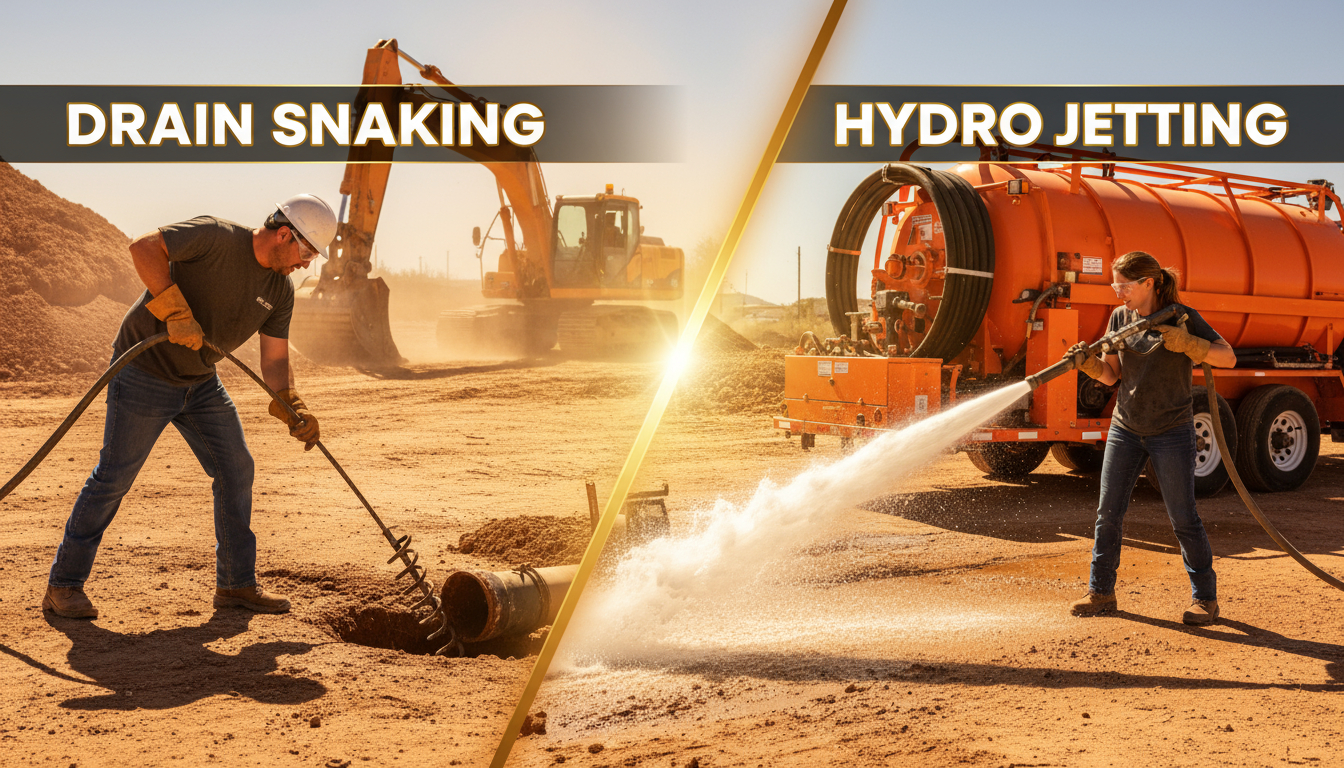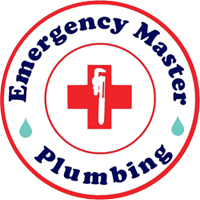

Drain snaking and hydro jetting are both effective methods for clearing clogs, but hydro jetting often proves superior for severe or recurring blockages in Arizona’s plumbing systems due to its thorough cleaning power. The best choice depends on the clog’s nature, your pipes’ condition, and local factors like hard water and desert debris.
Introduction to Clog Clearing Methods
Clogs in plumbing systems can disrupt daily life, leading to backups, slow drains, and potential water damage. In Arizona, where hard water and mineral buildup are common due to the arid climate, choosing the right clog removal method is crucial for long-term pipe health. This article compares drain snaking and hydro jetting, two popular techniques used by professional plumbers. We will explore how each works, their advantages and disadvantages, and which might be better suited for Arizona homes and businesses. By understanding these options, you can make informed decisions to solve clog problems efficiently and prevent future issues.
Arizona’s unique environment plays a significant role in plumbing challenges. The state’s high mineral content in water often leads to scale buildup inside pipes, exacerbating clogs from hair, grease, soap scum, and even tree roots invading sewer lines. Professional intervention is key to avoiding DIY mistakes that could worsen the problem. Whether you are dealing with a minor kitchen sink blockage or a major sewer line obstruction, knowing the differences between snaking and hydro jetting can save time and money.
Understanding Drain Snaking
Drain snaking, also known as augering, involves using a flexible metal cable with a cutting head to break through clogs. Plumbers insert the snake into the drain and rotate it to dislodge debris, allowing water to flow freely again.
This method has been a staple in plumbing for decades because of its simplicity and effectiveness for everyday clogs. In Arizona, where residential plumbing often deals with buildup from calcium-rich water, snaking is frequently used for quick fixes in sinks, showers, and toilets. The process typically takes 30 to 60 minutes, depending on the clog’s location and severity.
How Drain Snaking Works
The plumber feeds the snake into the pipe until it reaches the blockage. By cranking or powering the device, the head grinds away at the obstruction, such as hairballs or food particles. Once cleared, the snake is removed, and the drain is tested for proper flow.
Snaking is particularly useful for accessible clogs within 50 feet of the entry point. It requires minimal equipment, making it a go-to for emergency situations. However, it may not fully clean the pipe walls, leaving residue that can lead to recurring issues.
Pros of Drain Snaking
- Cost-Effective: Generally cheaper than hydro jetting, with average costs ranging from $100 to $300 in Arizona.
- Quick Resolution: Ideal for minor clogs, providing fast relief without extensive setup.
- Minimal Disruption: No need for large machinery, so it’s suitable for indoor plumbing issues.
- Versatile for Small Pipes: Works well in narrow residential lines without risking damage.
Cons of Drain Snaking
- Temporary Fix: It punches a hole through the clog but doesn’t remove all buildup, potentially leading to quicker re-clogging.
- Limited Reach: Less effective for deep sewer line blockages common in older Arizona homes.
- Potential Pipe Damage: If pipes are corroded or fragile, the snake’s metal head could cause scratches or punctures.
- Not Ideal for Roots: Tree roots, prevalent in Arizona’s desert landscaping, may require repeated snaking without addressing the root cause.
In problem-solving terms, if your Arizona home experiences frequent minor clogs from daily use, snaking offers a straightforward solution. For instance, a clogged bathroom sink due to hair and toothpaste residue can often be resolved with snaking, restoring function without invasive work.
Exploring Hydro Jetting
Hydro jetting uses high-pressure water streams to scour the inside of pipes, removing clogs and buildup completely. A specialized hose with a nozzle is inserted into the pipe, and water is blasted at pressures up to 4,000 PSI to flush out debris.
This method is more advanced and is gaining popularity in Arizona for its ability to handle the region’s hard water issues. It’s especially effective for commercial properties or homes with extensive plumbing networks, where thorough cleaning prevents future problems.
How Hydro Jetting Works
A plumber first inspects the pipes with a camera to ensure they can withstand the pressure. Then, the jetting equipment directs pressurized water through the line, disintegrating grease, scale, and roots while cleaning the pipe walls. The debris is flushed out, leaving pipes nearly as clean as new.
The process can take one to two hours and is often preceded by a video inspection to identify the clog’s exact location. In Arizona’s dry climate, where sediment from infrequent rains can enter sewer systems, hydro jetting provides a deep clean that snaking cannot match.
Pros of Hydro Jetting
- Comprehensive Cleaning: Removes not just the clog but also years of accumulated grime, reducing the likelihood of future blockages.
- Effective Against Tough Clogs: Ideal for grease, mineral deposits, and tree roots, which are common in Arizona due to hard water and invasive vegetation.
- Long-Term Savings: By preventing recurring issues, it can lower overall maintenance costs over time.
- Eco-Friendly: Uses only water, avoiding harsh chemicals that could harm Arizona’s sensitive water table.
Cons of Hydro Jetting
- Higher Cost: Typically ranges from $300 to $600 in Arizona, depending on the job’s complexity.
- Requires Professional Equipment: Not a DIY option; needs specialized tools and expertise to avoid pipe damage.
- Not for All Pipes: Fragile or damaged lines, common in older Arizona homes built before the 1980s, may not tolerate the pressure.
- Time-Intensive Setup: Involves more preparation, including pipe inspections, which can extend the service time.
For Arizona residents facing persistent clogs, hydro jetting solves the root problem. Consider a scenario where a main sewer line is blocked by scale and roots; hydro jetting clears it entirely, improving overall plumbing efficiency and preventing backups during monsoon seasons.
Comparing Drain Snaking and Hydro Jetting
When deciding between drain snaking and hydro jetting, consider the clog type, pipe condition, and frequency of issues. Snaking is better for simple, isolated clogs, while hydro jetting excels in severe or preventive maintenance scenarios.
| Aspect | Drain Snaking | Hydro Jetting |
| Cost | Lower ($100-$300) | Higher ($300-$600) |
| Effectiveness | Good for minor clogs | Excellent for tough, recurring clogs |
| Cleaning Depth | Breaks through clog | Scours entire pipe |
| Time Required | 30-60 minutes | 1-2 hours |
| Best For | Residential sinks and showers | Sewer lines and commercial pipes |
| Risk to Pipes | Moderate (possible scratching) | Low if pipes are inspected first |
In Arizona, hydro jetting often edges out snaking for long-term results, especially in areas like Phoenix or Scottsdale where hard water accelerates buildup. If clogs recur every few months, hydro jetting addresses underlying issues like mineral deposits more effectively.
Arizona-Specific Considerations
Arizona’s desert environment introduces unique plumbing challenges that influence the choice between snaking and hydro jetting. Hard water from sources like the Colorado River leaves calcium and magnesium deposits, narrowing pipes over time. In regions like the Valley of the Sun, temperatures fluctuate dramatically, causing pipes to expand and contract, which can dislodge debris and create clogs.
Tree roots from drought-resistant plants like mesquite seek moisture in sewer lines, making hydro jetting preferable for its root-cutting capability. During monsoon seasons, sudden rains can wash sand and silt into drains, requiring robust cleaning methods. For homes in older neighborhoods, such as those in historic Phoenix districts, snaking might suffice for minor issues, but hydro jetting is recommended for comprehensive maintenance to avoid costly repairs.
Local regulations in Arizona emphasize water conservation, aligning with hydro jetting’s chemical-free approach. Plumbers must comply with state plumbing codes, ensuring methods like these are performed safely to prevent groundwater contamination.
When to Choose Each Method
Select drain snaking for quick, affordable fixes on minor clogs in healthy pipes. It’s ideal if the blockage is recent and not due to systemic buildup.
Opt for hydro jetting when dealing with stubborn, recurring clogs, or as preventive care every few years. This is particularly beneficial in Arizona for pipes affected by hard water or roots.
Always consult a professional for an assessment. A camera inspection can reveal if your pipes are suitable for hydro jetting or if snaking is safer.
Prevention Tips for Clogs in Arizona
Preventing clogs starts with mindful habits. Install drain screens to catch hair and food particles. Avoid pouring grease down the sink, as it solidifies in cooler pipes.
In Arizona, regular water softener maintenance reduces mineral buildup. Schedule annual plumbing inspections to catch issues early. For outdoor drains, clear debris after storms to prevent silt accumulation.
Using enzyme-based cleaners monthly can break down organic matter without damaging pipes. Educate household members on what not to flush, like wipes or feminine products, to minimize risks.
Conclusion
Ultimately, while drain snaking offers a fast and economical solution for minor clogs, hydro jetting provides a more thorough and lasting fix, making it often the better choice for Arizona’s challenging plumbing conditions. By weighing factors like clog severity and local environmental influences, you can choose the method that best protects your home.
For expert assistance with drain snaking or hydro jetting in Arizona, we recommend Emergency Master Plumbing & Air. Contact them at 623-584-4706 for 24/7 service and reliable solutions to your plumbing needs.
